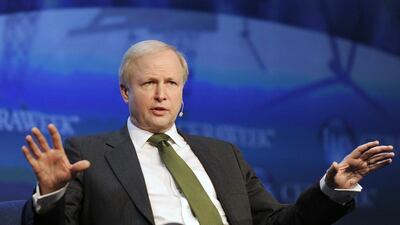Since he took over as chief executive of BP in 2010, in the wake of the Gulf of Mexico disaster, Bob Dudley has earned US$77 million in salary, bonuses and pension payments. About $20m of that relates to last year, when the company announced a loss of $5.2 billion and he was awarded a 20 per cent increase. During this period, the share price of the oil giant (market cap: $94bn) has fallen by 20 per cent and now languishes around a five-year low of $30, just more than half its level of 2014.
It was, therefore, of no great surprise to anyone other than the company’s remuneration committee that shareholders at the company’s annual meeting last week voted overwhelmingly against his package. The successful rebellion was met with a groundswell of enthusiasm across the City, where there are widespread fears that executive pay, particularly for poorly performing chief executives, has got out of hand. Surely Mr Dudley would have done the same job and worked just as hard if he had been paid a modest $10m a year? Or even $5m?
Smith & Nephew, an FTSE 100 medical equipment company, also suffered a defeat on its remuneration report last week, although in its case the chief executive Olivier Bohuon’s package actually fell from $6.8m to $5.5m, which shareholders still thought was too high.
The last time the shareholders of a major British company voted in such overwhelming force against a chief executive’s package was in the “shareholders’ spring” of four years ago, when WPP’s Martin Sorrell had his package rejected (the vote, as in the case of BP, was not binding). Xstrata suffered a similar fate. But as with other “springs”, this one soon ran out of momentum – until last week.
The rebellion is well and truly under way, and as one commentator pointed out over the weekend, “boardrooms are now gripped with fear that the BP vote has emboldened shareholders”.
It is past time. The average pay ratio between a FTSE 100 chief executive and the average worker is now 150 times compared with only 50 times in the 1990s, when it was already a looming social and political issue. And it is still widening by the day.
Mr Dudley’s package may have brought the whole issue to a head. A cross-party energy select committee in the British parliament will today consider whether to call in members of the BP board to quiz them about his pay award, and the company is under pressure to remove the non-executive director who heads its remuneration committee, Ann Dowling. Angus MacNeil, the energy committee’s chairman, has already branded pay packages as having “little or no connection with the real world”.
Over the weekend, Andrew Tyrie, the conservative MP who chairs the influential treasury committee in the British House, stepped into the fray to urge investors to maintain their stand against excessive pay for corporate bosses, and to go much further than they have done so far. Mr Tyrie is no lightweight – he steered legislation through both houses to curb and claw back bankers’ bonuses, and is keen to extend that beyond the banking sector.
"Public companies can and should listen to their owners," he told the Financial Times on Sunday. "Shareholders will support big rewards once they are clearly merited. But in recent years, they have seen senior management amply rewarded when things go well and apparently almost as well-rewarded when things go badly." Shareholders, he said, now face a "defining moment".
It is certainly going to be a defining week. On Thursday, Mark Cutifani, the chief executive of the Anglo American mining group, faces shareholders who are similarly primed to rebel, with shareholder organisations advising their members to vote against his package. Anglo American slumped to a record $5.5bn pre-tax loss last year, even bigger than BP, but Mr Cutifani still notched up remuneration totalling £3.4m (Dh17.7), little changed from the £3.7m he earned in 2014, despite the fact that he has embarked on a strategy of shrinking the company by two-thirds and the workforce from 120,000 to 50,000 over the next five years.
Inspired by the BP vote, shareholders are now lining up other targets: Mr Sorrell’s £70m package, which dwarfs everything, will be up for review in June; Shire’s £14.6m package to Flemming Orskov will be attacked on April 28; Aviva and Reckitt Benckiser are down for May.
In some cases, the protests will be muted by the fact that the companies are actually doing well – shares in Reckitt, WPP, Aviva, Shire and Smith & Nephew have outperformed the index. Mr Sorrell in particular has delivered huge value for shareholders since he founded the company more than 25 years ago, and the shares have trebled in the past five years, giving the company a market value of £21bn, more than any other advertising business in the world.
But there is no case for the chief executive of an underperforming company, particularly when it is a huge loss-maker like BP and Anglo, to be given such hefty packages. It’s a time for restraint and common sense – or there will be something more than a shareholders’ spring.
Ivan Fallon is a former business editor of The Sunday Times.
business@thenational.ae
Follow The National's Business section on Twitter

